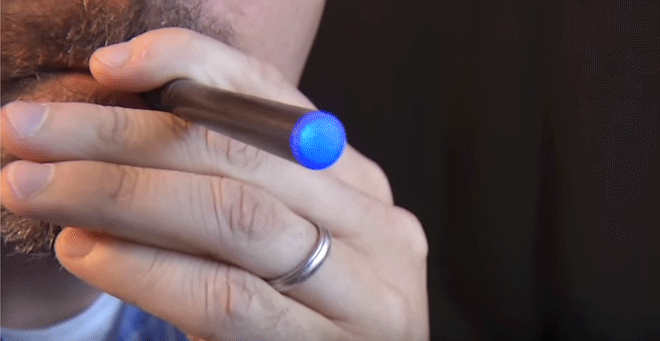 |
|
|
The U.S. Food and Drug Administration has decided to extend its regulatory authority to all tobacco products, including e-cigarettes, pictured here. |
Tobacco prevention and treatment experts at UMass Medical School are applauding the U.S. Food and Drug Administration’s historic decision to extend its authority to all tobacco products, including e-cigarettes. The rule prohibits sale of tobacco products to anyone under the age of 18.
“This is a new milestone in restricting youth access to tobacco products other than cigarettes through laws and regulations,” said public health researcher Wenjun Li, PhD, associate professor of medicine in the Division of Preventive and Behavioral Medicine. “It closes many loopholes in regulations concerning tobacco manufacturing and marketing, which was long overdue.”
The regulations will help the FDA prevent misleading claims by tobacco product manufacturers, evaluate the ingredients of tobacco products and how they are made, as well as communicate their potential risks.
Nicotine addiction expert Joseph DiFranza, MD, whose groundbreaking research found that children get addicted to nicotine sooner and more easily than previously believed, has testified in support of the e-cigarette regulations. “In a setting of a complete lack of federal regulation of these products, manufacturers have enjoyed free rein to market these addictive products to children,” said Dr. DiFranza, professor of family medicine & community health.
The regulations clear the way for further research to close the knowledge gap about the effects and potential health risks of e-cigarette vapor. “The FDA’s decision opens the door to do more research on the health and addiction risks of e-cigarettes as well as any potential role they may have as an aid in smoking cessation,” said Douglas Ziedonis, MD, chair and professor of psychiatry.
Efforts to teach health care providers how to address tobacco use with patients and to develop effective smoking interventions and treatments are also needed to complement public health laws. Judith Ockene, PhD, the Barbara Helen Smith Chair in Preventive and Behavioral Medicine, professor of medicine and chief of the Division of Preventive and Behavioral Medicine, is a pioneer in such efforts. “Changes in policies and regulations help drive the need to alter a behavior such as use of e-cigs by youth,” Dr. Ockene noted. “The new regulations will cause some to not use e-cigarettes in the first place.”
“The new rules have the potential for reducing the prevalence of nicotine dependence” agreed Lori Pbert, PhD, professor of medicine and director of UMass Medical School’s Center for Tobacco Treatment Research and Training. But she cautioned, “It will be important to monitor the impact of the implementation of the new regulations on both youth and adult tobacco use, and to ensure robust enforcement of the new rules moving forward.”
Tobacco regulation advocates at UMMS continue pushing for even stricter legislation that will raise the legal age to purchase tobacco products from 18 to 21. Several Central Massachusetts communities have already taken this measure, and Worcester is holding a public hearing on a similar restriction in June.
In attendance will be Tina Grosowsky, MA, project coordinator for the Central Massachusetts Tobacco Free Community Partnership, a program of the Department of Psychiatry at UMass Medical School and clinical partner UMass Memorial Health Care. “In Massachusetts, high school student smoking rates have dropped, but now we’re seeing a significant increase in e-cigarette use among young people,” Grosowsky said. “We know the tobacco industry targets youth with products that are sweet, cheap and easy to get. These regulations will provide additional prevention measures to prohibit youth from accessing them.”
Pediatrician Lynda Young, MD, spoke to the Worcester Telegram & Gazette about the new FDA regulations. “Pediatricians have been just screaming about this for a number of years,” said Dr. Young, professor of pediatrics at UMMS and vice chair of Tobacco Free Mass, a coalition formed in 1992 to reduce tobacco use and secondhand smoke exposure in the commonwealth. “We’re very pleased.”
Related links on UMassMedNow:
New study by UMMS shows Boston has reduced youth access to flavored cigars
Teaching medical students to help patients manage their weight, quit smoking
DiFranza calls on FDA to ‘act with uncharacteristic speed’ to regulate e-cigarettes
Newsmaker: Congressional Report: Regulate E-Cigs
Video: Tobacco-free decision by CVS benefits youth
New data shows spike in smokeless tobacco sales